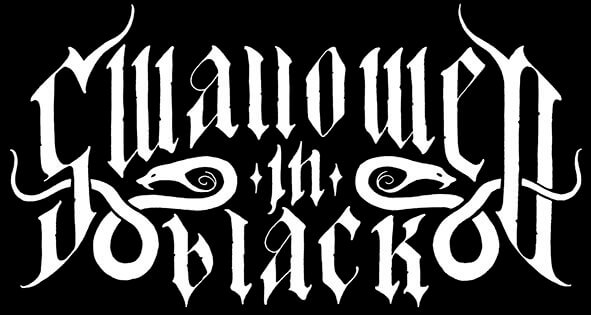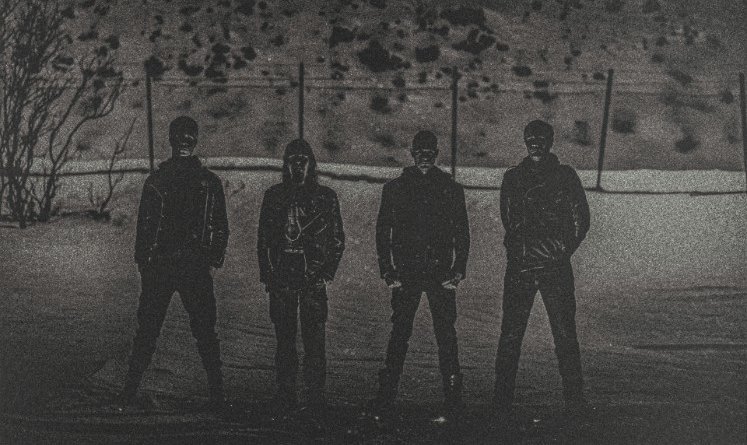“THERE’S A LOT I HONOUR ABOUT THE ORIGINATORS OF BLACK METAL AND WE WOULDN’T BE HERE TODAY IF IT WEREN’T FOR THEM” – D.G. (MISÞYRMING)
At once revisiting and reimagining the raucous belligerence of ‘Söngvar elds og óreiðu’ whilst expanding upon this trailblazing Icelandic enigma’s aptitude for moving into and exploring new terrain, Misþyrming’s ambitious and infuriatingly immersive third full-length ‘Með hamri’ redefines the boundaries of what Black Metal can and should be. The creative mind behind this cold:molten masterpiece, D.G., considers the ongoing evolution of an irresistible, irrepressible force that refuses to stand still or follow rules; why art must invariably emanate from an honest place; paying homage to Black Metal’s originators and traditions; harnessing that magical energy of four souls hitting full speed; deploying cold transitions to instil drama and psychedelia; and why he feels honoured to be mentioned in the same breath as fellow countrymen Svartidauði and Sinmara.
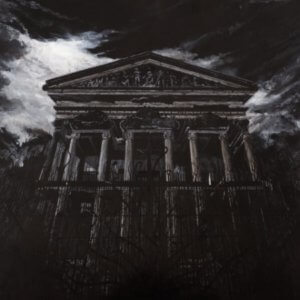 Preparing for this interview, it came to my attention that Misþyrming celebrates ten years in existence this year – a milestone worth observing and I’m sure it’s been quite a journey with plenty of ups and downs along the way?
Preparing for this interview, it came to my attention that Misþyrming celebrates ten years in existence this year – a milestone worth observing and I’m sure it’s been quite a journey with plenty of ups and downs along the way?
“Yes, definitely more ups than downs. I’m not ready to celebrate ten years because I’d say it was only like the idea of the band that started in 2013 and it wasn’t really until the end of that year that we started working on stuff for real. We started tracking the first album in the beginning of 2014.”
There is a saying around here that one should never let the grass grow beneath their feet, alluding to a need to constantly change, move forward and evolve. Obviously one of the easiest things in the world for Misþyrming, after the success and popularity of debut full-length, ‘Söngvar elds og óreiðu’, would have been to make the same record three times rather than taking risks and changing things up with each subsequent release. Was this something you placed a lot of stock on – always taking things forward to a new level, doing something different each time?
“I’ve always been ambitious about each composition I make. Every time I write a song I learn something new and try to challenge myself and not repeat everything that I’ve done before. Of course, I’m repeating a lot of patterns and I know there are a few things that I’m familiar with that I have as go-to approaches when it comes to arrangements, chord progressions or whatever, but I always try to push it a bit more. When I’m listening to music that inspires me, I ask myself why am I inspired. So I am always keeping my eyes open.”
Whilst keeping your eyes, ears and mind open, would you be thinking primarily of satisfying your own creative impulses or are you also considering what people in the audience might like to hear?
“Well, I would definitely not want to repeat what I have already done just for the audience. I’m mostly writing for myself; I wouldn’t want to bore myself.”
One thing that strikes me about the latest Misþyrming LP, ‘Með hamri’ is how explosive, angry, ferocious and urgent the opening assault is – the title track presents an eruption of pure untethered rage. The vocals are utterly unhinged – is this one of your angriest offerings to date – both the song itself and the album as a whole?
“Yes, it’s like, if we compare this album to the first one, I think there is a bit more of a match in the level of aggression. There were more ‘soft’ or ‘catchy’ parts on ‘Algleymi’, whereas there was still definitely a lot of fury behind these songs. When the four of us enter the rehearsal space, dim the lights and start playing… everybody’s going at full speed, all gas, no brakes. That’s a magical feeling and, for Misþyrming it’s logical to keep pushing the limit, trying to be as aggressive and explosive as possible.”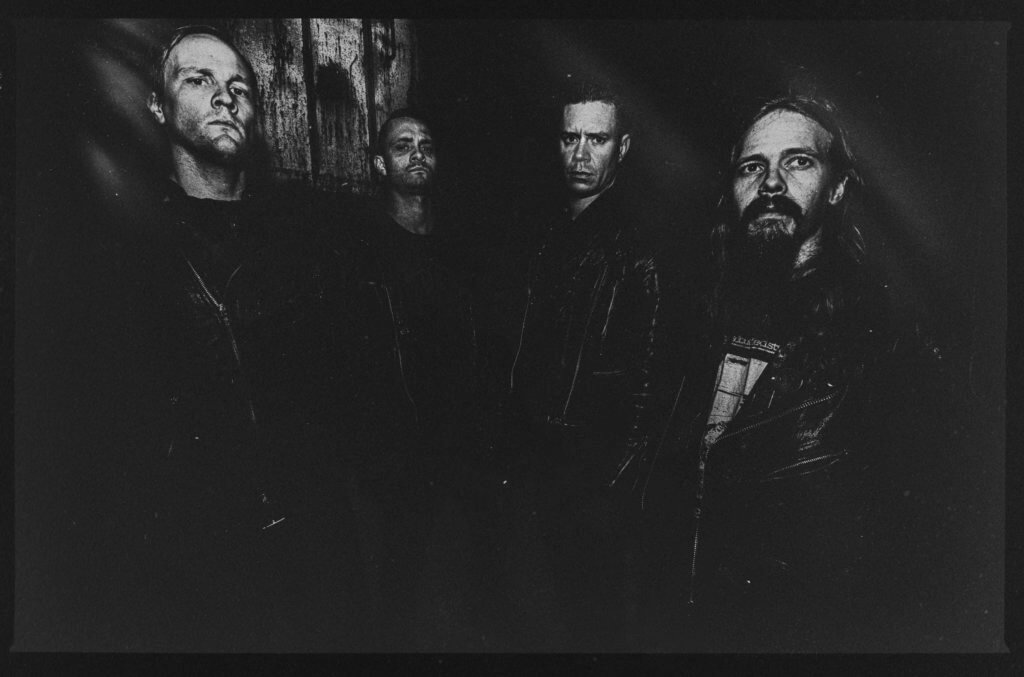
That covers the musical angle but in terms of what is fuelling you mentally, what is the source of / catalyst for the fury that is so evident on this album?
“It’s actually kind of hard to pinpoint because there is clearly a lot of aggression that I feel I need to express in this music and, of course, Black Metal and Metal in general is a fucking powerful way to be cathartic about your dark side. So there’s bits and pieces of, for instance, misanthropy in there, or whatever the cliché topics are, but it’s genuine at least.”
I know it’s not a competition and I’m sure you don’t look at it that way, but, of Iceland’s iconic Black Metal ‘big three’, that all spawned around the same time and same place, Misþyrming becomes the first to release a third full-length. It’s something of a milestone to get past that glass ceiling to album number three and would suggest that you are here for the long haul – that Misþyrming is an enduring force and will now be releasing records regularly for many more years to come?
“Yeah, it’s a milestone for me and I would maybe say that somebody like you would be in a better position to make such claims. But I feel very satisfied with just proving it to myself – and all of us to ourselves, and to our fans as well – that we are consistent. And now that we have released the third album we are not settling for that. We are thinking what’s the next step, so it’s ongoing…”
Because a lot of them come and go, flitting in and out of existence, disappearing more quickly than they appeared in some cases, many Black Metal bands never get past a first or second album. Some don’t even release one!
“Yeah, it’s a syndrome that I think is unfortunately way too common. An artist gets a spark of inspiration for a project, maybe they even manage to do an album but sometimes it doesn’t even go further than maybe one rehearsal, or one demo, and then bands fade away. I think that’s kind of sad. I don’t know what causes it, but probably the source of inspiration was just momentary. You know Lurker of Chalice, the Leviathan side-project? Jef said in an interview that there was a muse for that particular album. He was very mysterious about it, and he said that the muse was gone, so that project only saw one album and was then concluded. You can’t place expectations on artists to make more art. I think that’s kind of greedy, because art should always come from an honest place, not because of pressure. But, yeah, it’s disappointing when something is exciting for a brief moment and then the inspiration vanishes. I think this might be a problem today with social media and just the internet in general, that people are much more inclined to lose focus on anything and you see it with more years passing between each album by pretty much every band. I mean, the ‘80s bands were doing a new album every year, more or less, and now we’re seeing it every three years at best.”
To what extent does the arrival of ‘Með hamri’ represent a triumph of spirit, a triumph of will and a triumph of conviction for you?
“We made this press-release text which was kind of arrogant and funny at the same time – which it was exactly supposed to be. We are making a statement with this album: We have high demands when it comes to Black Metal. This is our example and we do believe in our cause.”
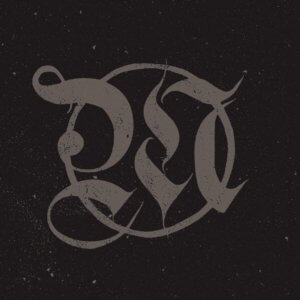 Do you ever tire of the comparisons with Sinmara and Svartidauði? If so, apologies for doing it again here… While these appraisals and assumed associations are inevitable due to your geographical location and vintage, Misþyrming has always had its own unique sound and approach. Where do you stand on all of this?
Do you ever tire of the comparisons with Sinmara and Svartidauði? If so, apologies for doing it again here… While these appraisals and assumed associations are inevitable due to your geographical location and vintage, Misþyrming has always had its own unique sound and approach. Where do you stand on all of this?
“I’m actually happy with that question. I’ve seen it thrown out online but I’m rarely asked about it. I’m more tired of being asked about the Icelandic scene in general – like ‘what is the Icelandic sound?’ – because I can’t really tell you what it is, the Icelandic sound, I’m not very sure myself. But being compared to those two bands, or put in the same category as them, I think that’s just fucking great because these bands existed before Misþyrming and were the first Black Metal bands I ever saw live. They gave me quite a lot of inspiration, especially their shows, and I was very excited as a teenager sneaking into bars that I was not of legal age to do so and getting the opportunity to see them live. The darkness was tangible and very inspiring, so I’m honoured to be considered to have reached that same level.”
Each Misþyrming album belongs to its own unique time and place. Each is markedly different and there is a clear evolution taking place from one to the next. This was most apparent in the transition from ‘Söngvar elds og óreiðu’ to ‘Algleymi’ and is noticeable again now (although it’s obviously still recognisable as Misþyrming). Conceptually and musically, how would you compare ‘Með hamri’ to the previous two records?
“The writing process for this album was pretty focussed. I wrote it for a single LP, so I had a very clear idea how much material I would fit on Side A and Side B. I thought a lot about the dynamics, how it should flow. The first album is basically just a compilation of various songs that I wrote at that time and they were all compiled as the ‘songs of fire and chaos’, because that’s what these songs had in common. On ‘Algleymi’, I had a bit more of a conceptual idea – the demise of man by his own deeds, the oblivion of man. For ‘Með hamri’, I’m expanding on my arrangements, trying to make the compositions greater. It’s just a logical continuation of Misþyrming.”
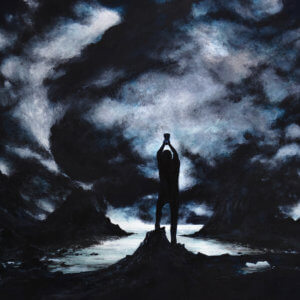 Do you see ‘Með hamri’ as a markedly different album to the previous two? The debut was raw, intense and urgent; the follow-up was more refined and the latest record does seem to exist somewhere in between the two, although it is very mature (in a good way) and explores a lot of new ground… The steady improvement is apparent as you are naturally getting better as musicians, but it also seems to take a step back towards the angrier, rawer feel of ‘Söngvar elds og óreiðu’…
Do you see ‘Með hamri’ as a markedly different album to the previous two? The debut was raw, intense and urgent; the follow-up was more refined and the latest record does seem to exist somewhere in between the two, although it is very mature (in a good way) and explores a lot of new ground… The steady improvement is apparent as you are naturally getting better as musicians, but it also seems to take a step back towards the angrier, rawer feel of ‘Söngvar elds og óreiðu’…
“Well, all these albums have a common factor in that for each of them I had a big vision and was very ambitious. After the first album I had an idea of what I am going to top and what I had to surpass. Again, when I was working on the third album, I had those two albums to reference. I think ‘Algleymi’ headed in maybe a bit too soft and poppy direction, although overall I’m very happy with the music itself still today. This time around, I wanted to take it back into my hands and be a bit more firm.”
The ambient, almost-industrial flourishes at the end of the first few tracks add an otherworldly, distant, coldness (and a madness perhaps…) and remind me of Antaeus in a way. What was the thought process behind incorporating these soundscapes into the album?
“First of all, it’s a theatrical element. And a psychedelic element. If you really pay attention while you are listening – if you’re not letting anything interrupt you and focus on not only digesting the music but also living it, silence can kind of take you out of it. Going from one song straight to the next one, of course you can’t do that, but I think having these passages creates more of a constant flow and gives you a bit more time to realise and absorb what you just heard, and get yourself prepared for the next one. Some people might say that it’s killing the vibe, that you fall from the intensity that you already created and then you have to build it up again, but I don’t think we overdid it like that.”
It’s almost like an opportunity for reflection…
“Exactly. Like I said, it’s theatrical and it’s psychedelic, and I just really enjoy albums where this is executed properly. I think for instance, ‘Seven Chalices’ by Teitanblood is a very psychedelic album and this is to a large degree thanks to the passages that are going between each song, and of course also thanks to the artwork. And the same goes for Antaeus and hundreds of other bands. It’s a classic approach to have an intro on your album. Some people think it’s a tired element but I think having an intro has the significant purpose of setting the mood. And these interludes do also have a similar purpose. These ones I used for ‘Með hamri’ are definitely keeping the mood somehow intense and cold, like you say.
“Two of those ambient passages are written by Kristófer Páll, who is the only one other than me who has been involved on all the Misþyrming albums. He wrote lyrics for one song on ‘Söngvar elds og óreiðu’ and for one song on ‘Algleymi’. But on ‘Með hamri’, I didn’t need any lyrics. Kristófer makes electronic music with analog gear and he is quite fantastic. His solo project called aska, which is ‘ash’ in English, it’s absolutely stark and cold. We share a vision when it comes to Black Metal in general and we have very similar tastes in Black Metal, so I didn’t really need to give him any instructions. I just asked him if he would like to make some ambient passages that I would use between songs and he made these two that appear after the first song and after the third one. We didn’t do any alterations, I didn’t ask for any revisions or anything, I trusted his vision.”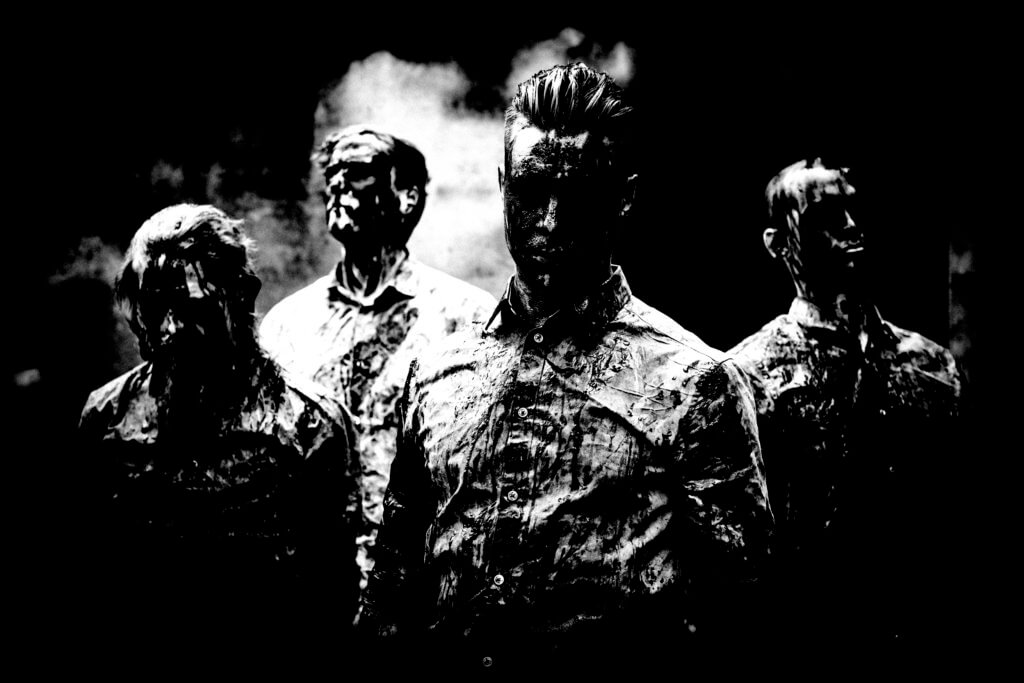
Do I detect an almost sci-fi, AI feeling at times on the album, specifically perhaps around ‘Engin vorkunn’ and ‘Blóðhefnd’, which, the more I listen, do appear to possess an otherworldly and interstellar (for want of a better description) quality?
“‘Engin vorkunn’ is very spiritual. I was inspired by two bands when I wrote that song and I think it’s kind of obvious what bands that might be … I don’t think I should even say. At least this cold feeling, that was a big factor when I was training the drummer and teaching him the songs, when we went through this fourth song I told him: be as simple and death-like as you can, soulless. It’s supposed to be a little bit groovy, but always at the same pace and when you keep this steady pace without having a lot of decorations you can link to this trance-like or mantra-esque feeling. I don’t know if that’s sci-fi-esque or what else…”
After everything that happened over the past three years, since ‘Algleymi’, with the world stopping and sort of re-starting again, does this feel almost like a new beginning or rebirth for Misþyrming? Do you feel in a way re-energised and born again?
“I wouldn’t make such a bold statement as that. I would rather just say it’s the next chapter. Of course, the pandemic had its effects, and now we are sort of back on track. Making the new album was of course one way to get back on track.”
Going into 2020, Misþyrming was on a real roll, gigging frequently, causing a stir globally and you had generated serious impetus. How much of a setback did the events of 2020 and 2021 (specifically mass gig cancellations) constitute for the band? Do you feel your momentum was disrupted a lot?
“Yeah, absolutely. The pandemic changed many, many things. Not only for Misþyrming but I can feel it in the scene here. But, like I say, now it’s like a new chapter and being here right now, strong as ever before, feels like we’re standing the test of time.”
Have you recovered fully from the lost momentum and got everything back on track?
“I think finally now, yeah. The new album is out and we just finished a European tour that was totally successful and we have loads of festivals booked throughout the year. We are in shape, so, yes, I think so.”
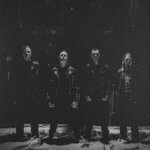 It almost feels like another lifetime looking back now… You were in Tallinn in Estonia preparing for a gig on March 15th, 2020, when the lights went out and the world grinded to a halt. But the show must go on, as they say, and you nevertheless performed the gig that night behind closed doors and live-streamed it. How surreal was that whole episode?
It almost feels like another lifetime looking back now… You were in Tallinn in Estonia preparing for a gig on March 15th, 2020, when the lights went out and the world grinded to a halt. But the show must go on, as they say, and you nevertheless performed the gig that night behind closed doors and live-streamed it. How surreal was that whole episode?
“I should give you the backstory first: we were on a small tour where we went to Lithuania and then Ukraine, Belarus and Russia, and Tallinn, Estonia was the last stop on that tour. This was at the time when Covid was hitting hard for the first time and when we left Iceland we kinda didn’t have an idea of the greatness of this pandemic, what the effects would be. We just didn’t think there would be such dramatic consequences of this new virus. We guessed people were being a bit hysterical, maybe it’s just a regular flu, and the media is always hysterical about everything anyway so we should always take that with a grain of salt… Anyway, after each show in this tour, the current country we were in closed their borders the day after we played. We played in Lithuania, went to Ukraine, and then Lithuania closed their borders. Then we went from Ukraine to Belarus and Ukraine closed their borders, etc. So it was like a domino falling at the back of our feet and we were just running from it. Fortunately, we made it through this tour and all the gigs happened and we made it from Russia – we were thinking it would be kind of strange to be stuck in Russia! – but we reached Estonia and that was the only country where we had to actually cancel the gig. The organiser of that show improvised very quickly. He had such a great response, booked a filming crew, they set up this streaming thing and we were up for it. Like, we were already there, they had invested money in getting us there, and they found a solution to do something instead of just cancelling the whole thing. This idea of streaming gigs was totally new; I think we were possibly one of the first bands in the world to do a streamed quarantine-concert. It felt kind of strange but we were lucky enough that there were actually 15 people present, which is essentially the crew, the organisers and maybe a couple of their closest friends. So, we did get a bit of applause and they were enthusiastic about it. We had a small but energetic crowd – they even got us to do an encore, haha!”
There are curveballs aplenty on the new record (as indeed there were on the previous one) – ‘Blóðhefnd’ is an eerie piece with martial drumming, ominous melodies and even some angelic choirs, followed by the epic closer, ‘Aftaka’ – the longest and perhaps most ambitious Misþyrming track to date at almost ten minutes. Makes me wonder just how painstaking the process of composing and piecing together this rather rich and diverse album actually was? There are a lot of subtle complexities and nuances interwoven into the fabric of the record – did you endure many sleepless nights along the way?
“It took me a year to complete ‘Aftaka’. I wrote half of it in my traditional way of writing in early 2020, but I couldn’t finish it. I thought ‘okay, this song definitely needs more attention, it needs to be tended to much more’, so I slept on it. I revisited it many times but couldn’t really figure out exactly how it should be. I wrote some of the other stuff in the meantime, so it didn’t literally take me a year to write that particular song, but a year passed, and then finally I figured it out. I was struck by inspiration and took my time on each and every detail until it was satisfactory. I had known that the time would come. What I already had in hand was very promising and I was not prepared to let that fade away and be forgotten about.”
You’ve been fortunate to be able to replace one amazing drummer with another equally amazing drummer. How does Magnús fit into or change the Misþyrming dynamic or modus operandi? Also, how do H.R.H. and Magnús (M.S.) compare as drummers? And how do they differ? Do they each have their own strengths or can they both do pretty much everything when it comes to power and precision?
“Of course there’s a bit of a change in our group – replacing a member is a big change – but I love both these drummers. They both have their strengths and they are fairly different. I would say Helgi is a bit more barbaric whilst Magnús has a big background in jazz, so they are quite different in style, but I think both fit in and have gracefully fulfilled their deeds as drummers for the band. We all get along and we were already getting along with Magnús a long time before this change happened. We had some side projects with him before and we already had an idea of how the dynamics would be.”
How much did you enjoy touring with the new material for the first time in January? Would you agree that Misþyrming comes into its own in the live environment? Is that one of the core reasons for your existence as a band, as you seem to really come into your element live on stage?
“There are two different sides to the band, one being the studio side and the other the live side. Misþyrming as a live band is possibly quite different from Misþyrming as a studio band, being a bit more unhinged in the live setting. The last tour now in January was very enjoyable. We decided to keep the set-list mixed, play ‘the classics’ so to say, but then of course now when we have a new album we want to play new stuff and that’s what the audience also expects us to do. It’s very enjoyable to mix it all together and that kind of gives a full picture, distilling the whole history of the band and the legacy of the band in a more concrete way.”
Do you have to make sure you are in good physical shape and ‘match fit’ for a tour? Do you consider nutrition, physical conditioning and generally keeping yourself in good shape? I can’t imagine how you could pull these gigs off if you were going around getting hammered every night, falling around the place, not sleeping… As a band, do you consider these things?
“I think we were a bit more careless in the beginning, and we learned the hard way what the consequences are if you party every night and place things like sleep to the back of your priorities. For this tour, I set some ground rules, just for myself, like staying sober until the show, maybe having one beer over the day. But not much more than that … I can feel it after two beers that the motor skills are affected and I think that’s the most vital thing. And of course being hung-over is never good and when you are on tour you have to be on point every day. We don’t have a crew that’s setting up the stage for us, we have to load in all the backline and set up the stage and do a sound check and then after the show we have to pack up, so you have to stay straight-minded.”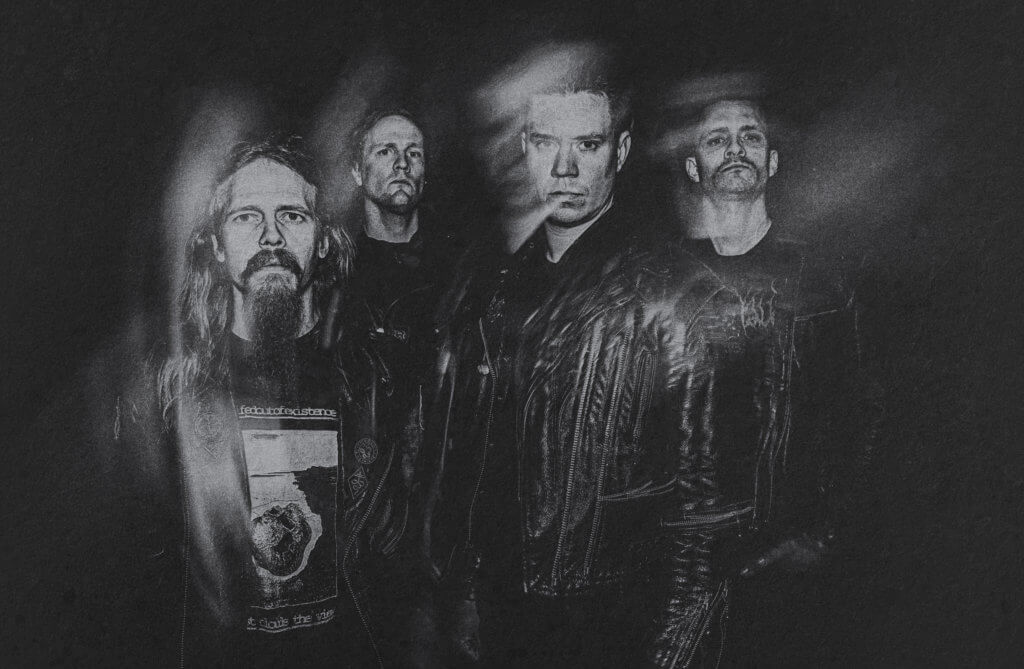
How important is the ideology and tradition of Black Metal to you? You are of course too young to remember first-hand how Black Metal set the northern skies ablaze in the early ‘90s but I’m sure you have read and learned all about those infamous early formative years? Do you identify with that original, seminal, defiant, outsider spirit of Black Metal?
“Absolutely. The idea of Black Metal was much more clear back in the day, and if you look at the Norwegian scene you will see there was consistency between all of that. It has of course expanded since and I think a lot of people today mistake what is actually Black Metal and what is not. I even think that I, being a long time enthusiast for the genre, am in a position to make claims regarding what qualifies as Black Metal and what doesn’t, at the risk of sounding arrogant or elitist – and maybe it is and if that’s the case then I will just own up to that, haha! There’s a lot I honour about the originators of Black Metal, and we wouldn’t be here today if it weren’t for them, without all the majestic albums that have been put out over the last three-four decades. For instance, using corpse paint is an homage – we are not trying to be original with that look. It’s tradition and we are honouring it. And this new album is a statement that this is how we envision or imagine what Black Metal should be and what it should sound like and feel like.”
While you are increasingly infusing and embellishing your art with unorthodox or unconventional flourishes that might not normally be associated with BM, how important is it that Misþyrming retains a very clear and pronounced Black Metal core? With Misþyrming, does it always have to be Black Metal first and foremost?
“I still think I should have total freedom to do whatever I want. You can hear it on the album. There is a lot of experimental stuff that people might question if it’s very Black Metal – and it’s also the case on ‘Algleymi’, having those ‘poppy’ or ‘catchy’ elements that might be considered too soft to qualify as Black Metal – so I think it’s better to portray the part. That in itself is much more of a statement than actually just talking shit.”
By consistently and exclusively using only your native Icelandic tongue with regards to all things Misþyrming, are you following in the footsteps of a long-running BM custom or is this something you decided to do yourself, irrespective of what is perceived as the BM way? What you feel most comfortable with?
“It has nothing to do with comfort. It has more to do with me wanting to stay genuine in how I express myself. You can kind of switch characters if English isn’t your native language. Expressing myself in my mother language feels much more genuine, it comes straight from the heart. However, I do appreciate singing in English when that is appropriate, say, for doing guest vocals with another band.”
